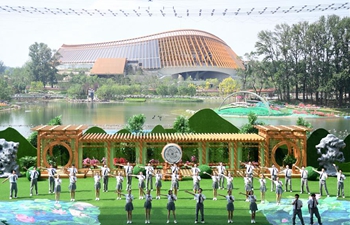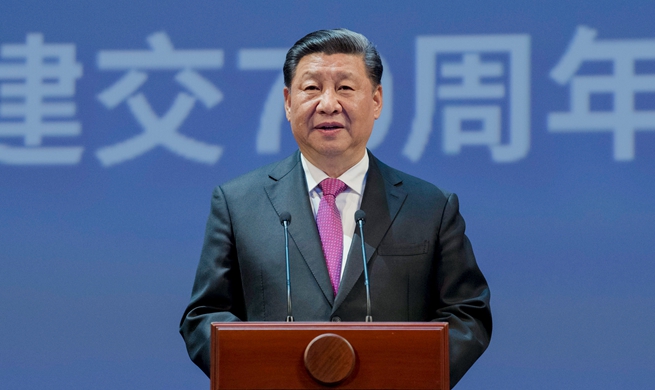TIANJIN, June 7 (Xinhua) -- Deer, peacocks and ostriches bask in the warmth of the sun and wander outside their wooden houses, against the backdrop of a surrounding rockery, fishing pond and large green vegetation.
Upon first glance, one might be tempted to think it is a park, but turning around, a petrochemical plant of Sinopec Group, the country's leading petroleum refiner and oil products producer, is operating on site in northern China's Tianjin municipality.
Hundreds of pipelines are set up to connect various high towers and oil refining equipment, which are busy producing clean oil and chemical products.
"We did follow the extensive growth model before," said Tong Wei, head of the production department of the group's petrochemical plant in Tianjin. The company, however, shifted to an intensive one gradually and stuck to building an ecological plant with the state-of-art technology.
In 2000, the plant welcomed a herd of deer as new family members, but more importantly to serve as the "environmental monitors."
"At the very beginning, we worried that they would not adapt to the environment here since they are more sensitive to the living environment," Tong said, adding that the workers recorded data on the notes every day and paid much attention to controlling the emission of wastewater and gas.
Day in and day out, the deer grew healthily under the greatest care of the staff. They said they feel like they are working in an ecological park not a petrochemical plant, and were accustomed to working with their friends now.
To better monitor the environment, the plant also launched an intelligent "environment map" to release real-time data, save historical data and analyze development trends on the water emission, as well as the volume, color and concentration of gas.
Dong Feng, director of a workshop in the refining department, said frequent checks were required for monitoring the environment in the past, but the current real-time monitoring can be realized by a smartphone, greatly reducing the front-line work intensity and improving management efficiency.
This garden-like petrochemical plant stands in stark contrast to people's memories of the roaring machinery and exhausting waste gas and water in the past. It attracted nearly 70 social groups and over 5,000 visitors in the past two years.
What is occurring in Tianjin mirrors the ecological transformation of other petrochemical companies across China.
Sinopec Beijing Yanshan Petrochemical Co. Ltd., which is in Fangshan District, created a wetland park inside its plant. The wetland water consisted of the plant's reclaimed industrial wastewater and recycled domestic sewage from surrounding residents. It has become a scenic spot.
Jiujiang petrochemical company in eastern China's Jiangxi Province also built an artificial pool as a way to monitor the quality of treated industrial sewage. Flowers and fish can be nurtured in the pool, said a local staff.
Zhang Minhua, professor of the School of Chemical Engineering and Technology in Tianjin University, said the ecological transformation, technology innovation and intelligent monitoring will be future trends of petrochemical plants, which can shed some light on the transformation and upgrading of traditional Chinese enterprises.

















